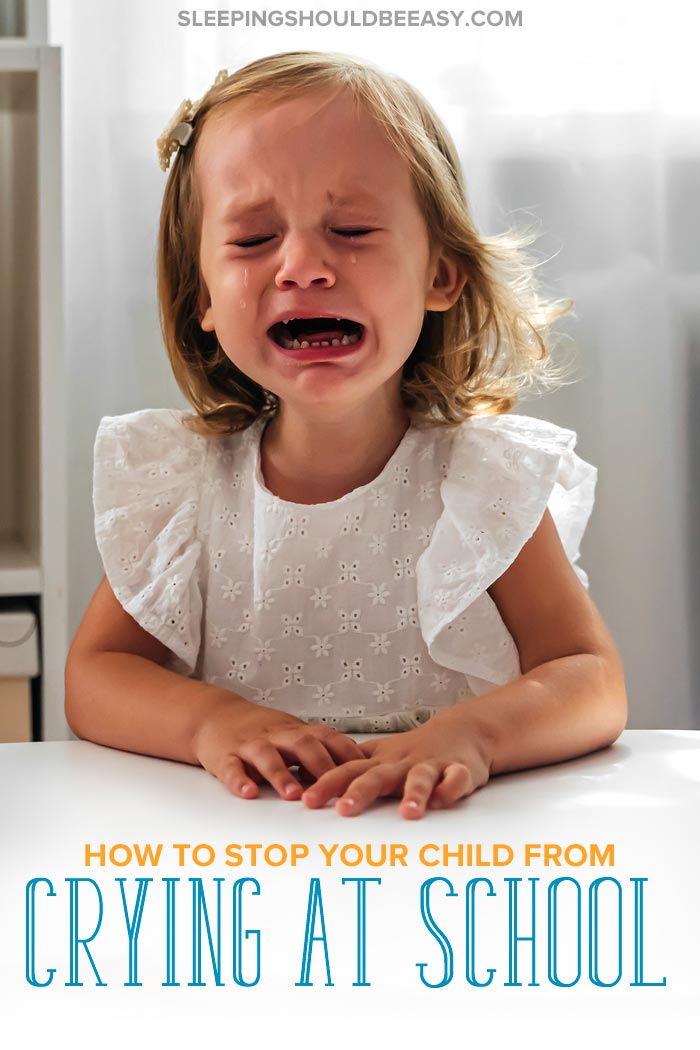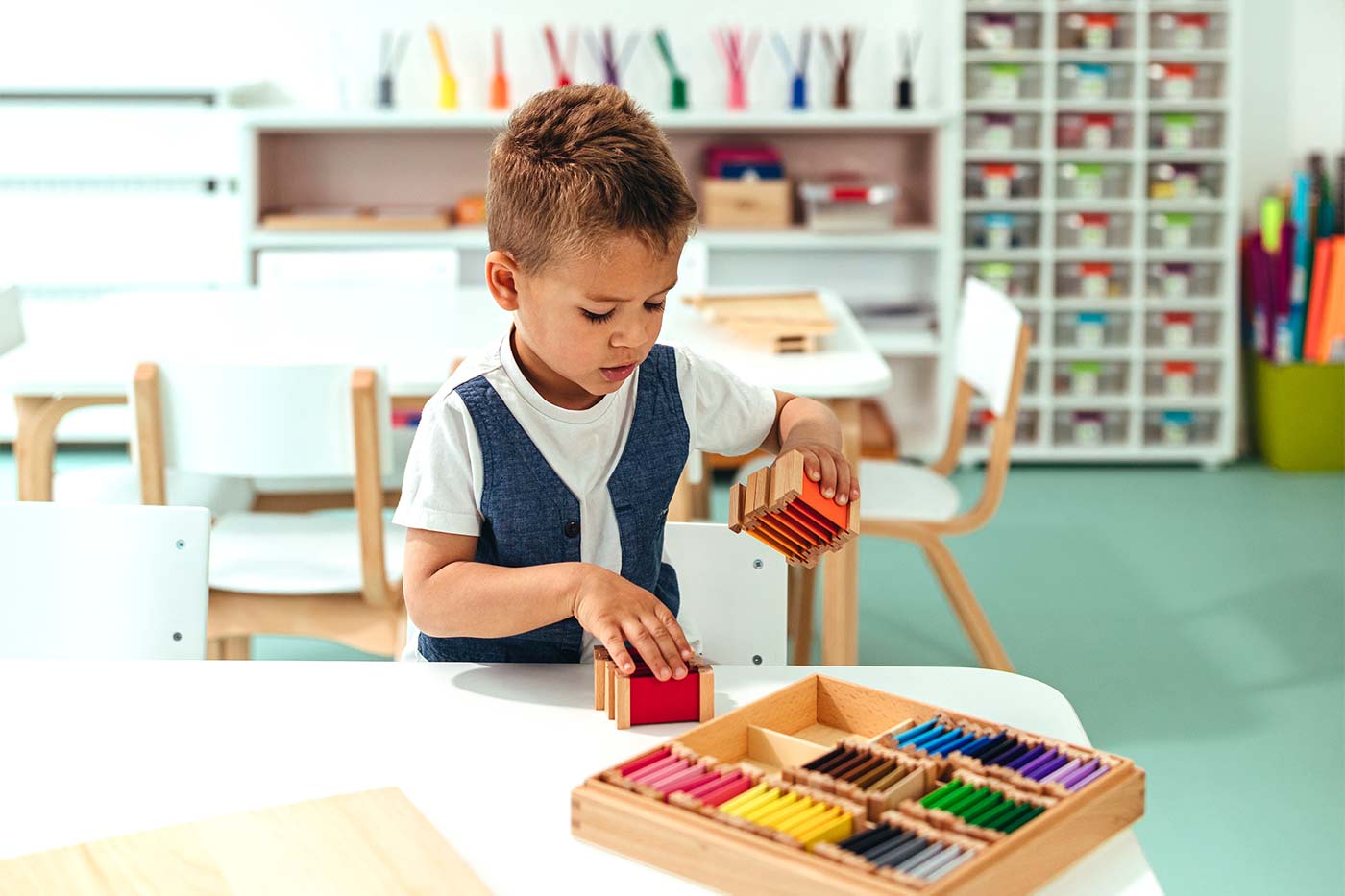How to Stop Your Child from Crying at School
Drop off time can be heart-wrench when your child is suddenly crying at school. Follow these simple best practices for tear-free school days.
 Kids react differently to school drop offs, don’t you think? Some hop out of the car with hardly a wave goodbye, while others are in tears the whole day.
Kids react differently to school drop offs, don’t you think? Some hop out of the car with hardly a wave goodbye, while others are in tears the whole day.
Well, my son belonged to the latter.
Morning drop offs were filled with daily meltdowns. He’d cry and scream that he didn’t want to go to school anymore. And even though my husband and I made sure to wave at him as we walked away, we’d still find him crying and wanting to come with us instead.
It was enough to make us feel awful for putting him through this.
I’ve since learned that we can do plenty to stop our kids from crying at school drop off and throughout the day. Take a look at what helped us turn things around. Hopefully, they can work for you as well:
Table of Contents
1. Make your goodbyes quick
We think that we’re helping our kids by staying a few extra minutes until they “settle in.” We relent when they ask us for one more hug and kiss before we leave.
The problem with prolonging your goodbye is that it sends the message that maybe your child shouldn’t be at school. That if you had it your way, he wouldn’t be here at all.
Instead, don’t linger too long, give an extra hug, or walk away waving the whole time. Once he’s settled in with the teacher, say a kind but quick goodbye and reassure him that you’ll see him later in the day.
2. Be confident
Are you anxious and worried during drop offs? Perhaps you profusely tell your child that the day will pass quickly, or you tear up in distress when saying goodbye.
The problem is, that can send the message that school isn’t a good place to be. Imagine being at a play date and telling her in front of the others, “Don’t worry, we’re only going to be here for 45 minutes.” Remember, you’ll see her in a few hours—she’s not traveling to another country for a month.
You should also show confidence in her ability to manage this new change. Seeing you so anxious might make her feel like she can’t cope without you or that she isn’t going to enjoy herself.
Instead, feel confident in both the school’s ability to take care of her as well as her own abilities to adapt on her own.
3. Start with a good morning at home
Make your mornings less hectic by making sure you’re meeting your child’s basic needs. Nothing makes for a crankier school day than feeling tired and hungry.
To start, make sure he’s getting enough sleep every night—10 to 12 hours is a good range to aim for. Eat breakfast at the table every day so he feels satiated throughout the morning.
Allow him to choose what to wear, giving him two options to pick from. And give yourselves plenty of time to get ready so that he doesn’t feel rushed as he eats or gets dressed.
4. Set expectations
Use the time before school to describe what your child can expect to unfold once she arrives.
For instance, remind her that she can ask the teacher for anything she needs help with. Tell her what you packed her for lunch (hopefully something she can look forward to!). And talk about the fun she’ll have, especially with activities she can’t do at home.
Then, this is when you can mention picking her up after school. Let her know that you’ll come get her at 3pm after she and her classmates have a snack. And make an extra effort to pick her up at the same time every day so she never doubts that you will.
5. Bring a piece of home
Ease your child’s anxieties by giving him a sentimental item from home. This can help him feel less alone and feel comforted by a familiar item.
For instance, tape a picture of your family on his pencil box or ask the teacher if he can keep a small stuffed animal in his backpack. When he feels anxious and scared, he has these special pieces of home to turn to.
6. Talk about how your child feels
A big change like going to school can bring a slew of emotions that can feel overwhelming to your child. To help her feel at ease, talk about and label these feelings so she knows that they’re normal and will come and go.
For instance, reassure her that it’s okay to feel sad when you’re apart, or that she might be nervous being in a new place. Remind her that she’s safe and loved in school, and that she’ll probably feel happy doing fun and interesting activities during the day.
7. Talk to your child’s teachers
Some kids struggle with anxiety more than others. If you’re truly concerned, talk to your child’s teachers about his behavior at school.
Ask them if his behavior is out of the ordinary, how he fares the rest of the day, and the reasons he cries during school. Enlist their help with saying goodbye, or alert them to any fears and extra comforting they should know about.
And ask them for their advice. They’ve been doing this for years and have seen all sorts of kids come and go. They can give you tips they’ve seen work with others that can work with your child.
Conclusion
We all wish our kids took to school like a champ, but rest assured that your child’s behavior is normal and doesn’t make her any worse than the next.
We forget we’re dealing with children sometimes. It seems silly to us, but these issues are just as real to them as our grown-up problems are to us. As I say in my book, 31 Days to Better Parenting:
“Knowing her behavior is normal, though frustrating, will give you the patience you need. You won’t hold the same expectations from her as you would another adult. You feel reassured that her crying at school is actually normal for her age, and that she’s still learning how to manage her emotions.”
Instead, focus on keeping your goodbyes quick and calm. The more confidently you leave—and consistently come back—the more secure she can feel. Start with a good morning at home and describe what she can expect to happen.
Give her a piece from home for extra comfort and label her emotions and feelings. Lastly, talk to her teachers about your concerns—they’ve been doing this for years and can give you the reassurance or advice you need.
Hopefully, she’ll stop crying at school and, who knows, maybe even hop out of the car without so much as a wave goodbye.
Free resources: Join my newsletter and grab your copy of The Power of Empathy—at no cost to you! You’ll learn how empathy is truly the secret key that makes a huge difference in how we interact with our kids:



